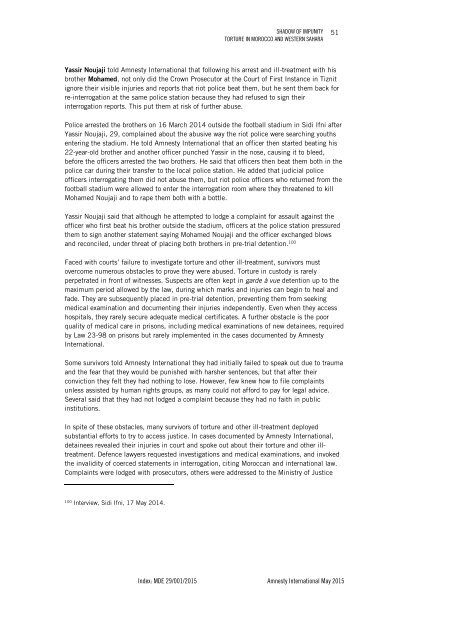7f2vH5qFw
7f2vH5qFw
7f2vH5qFw
Create successful ePaper yourself
Turn your PDF publications into a flip-book with our unique Google optimized e-Paper software.
SHADOW OF IMPUNITYTORTURE IN MOROCCO AND WESTERN SAHARA51Yassir Noujaji told Amnesty International that following his arrest and ill-treatment with hisbrother Mohamed, not only did the Crown Prosecutor at the Court of First Instance in Tiznitignore their visible injuries and reports that riot police beat them, but he sent them back forre-interrogation at the same police station because they had refused to sign theirinterrogation reports. This put them at risk of further abuse.Police arrested the brothers on 16 March 2014 outside the football stadium in Sidi Ifni afterYassir Noujaji, 29, complained about the abusive way the riot police were searching youthsentering the stadium. He told Amnesty International that an officer then started beating his22-year-old brother and another officer punched Yassir in the nose, causing it to bleed,before the officers arrested the two brothers. He said that officers then beat them both in thepolice car during their transfer to the local police station. He added that judicial policeofficers interrogating them did not abuse them, but riot police officers who returned from thefootball stadium were allowed to enter the interrogation room where they threatened to killMohamed Noujaji and to rape them both with a bottle.Yassir Noujaji said that although he attempted to lodge a complaint for assault against theofficer who first beat his brother outside the stadium, officers at the police station pressuredthem to sign another statement saying Mohamed Noujaji and the officer exchanged blowsand reconciled, under threat of placing both brothers in pre-trial detention. 100Faced with courts’ failure to investigate torture and other ill-treatment, survivors mustovercome numerous obstacles to prove they were abused. Torture in custody is rarelyperpetrated in front of witnesses. Suspects are often kept in garde à vue detention up to themaximum period allowed by the law, during which marks and injuries can begin to heal andfade. They are subsequently placed in pre-trial detention, preventing them from seekingmedical examination and documenting their injuries independently. Even when they accesshospitals, they rarely secure adequate medical certificates. A further obstacle is the poorquality of medical care in prisons, including medical examinations of new detainees, requiredby Law 23-98 on prisons but rarely implemented in the cases documented by AmnestyInternational.Some survivors told Amnesty International they had initially failed to speak out due to traumaand the fear that they would be punished with harsher sentences, but that after theirconviction they felt they had nothing to lose. However, few knew how to file complaintsunless assisted by human rights groups, as many could not afford to pay for legal advice.Several said that they had not lodged a complaint because they had no faith in publicinstitutions.In spite of these obstacles, many survivors of torture and other ill-treatment deployedsubstantial efforts to try to access justice. In cases documented by Amnesty International,detainees revealed their injuries in court and spoke out about their torture and other illtreatment.Defence lawyers requested investigations and medical examinations, and invokedthe invalidity of coerced statements in interrogation, citing Moroccan and international law.Complaints were lodged with prosecutors, others were addressed to the Ministry of Justice100Interview, Sidi Ifni, 17 May 2014.Index: MDE 29/001/2015 Amnesty International May 2015


